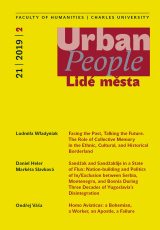Sandžak and Sandžaklije in a State of Flux
Nation-building and Politics of In/Exclusion between Serbia, Montenegro, and Bosnia During Three Decades of Yugoslavia’s Disintegration
DOI:
https://doi.org/10.14712/12128112.3247Klíčová slova:
Sandžak, Bosniaks, Muslims, national identity, national minorities, ethnicity, interethnic relations, social inclusion and exclusion, integration, state-building, break-up of YugoslaviaAbstrakt
This article deals with the contemporary history of Sandžak in the broader context of the politically, socially, and culturally formative processes that accompanied the disintegration of the Socialist Federal Republic of Yugoslavia (SFRY). The focus is the formation and negotiation of ethnonational identities amongst the local people of Muslim origin in relation to the recent regional political developments. The article discusses mainly the political negotiations of the “Sandžak Muslim” identity in the context of the three capitals of Belgrade, Podgorica, and Sarajevo. We suggest that the aforementioned social, political (state-building processes, regime and ideology metamorphoses), and also economic transformations in Serbia, Montenegro, and Bosnia had a significant impact on development of public identities amongst the people of Muslim origin who inhabit the historical region of Sandžak. These issues also open the question of the politics of social inclusion and exclusion, since Sandžaklije of Muslim origin were often excluded and some even persecuted in the relatively recent past by the dominant regime. This study is based on an interdisciplinary approach combining mainly historical and political analysis with the additional application of sociocultural anthropology.
Stahování
Publikováno
Jak citovat
Číslo
Sekce
Licence

Tato práce je licencována pod Mezinárodní licencí Creative Commons Attribution-NonCommercial-NoDerivatives 4.0.


